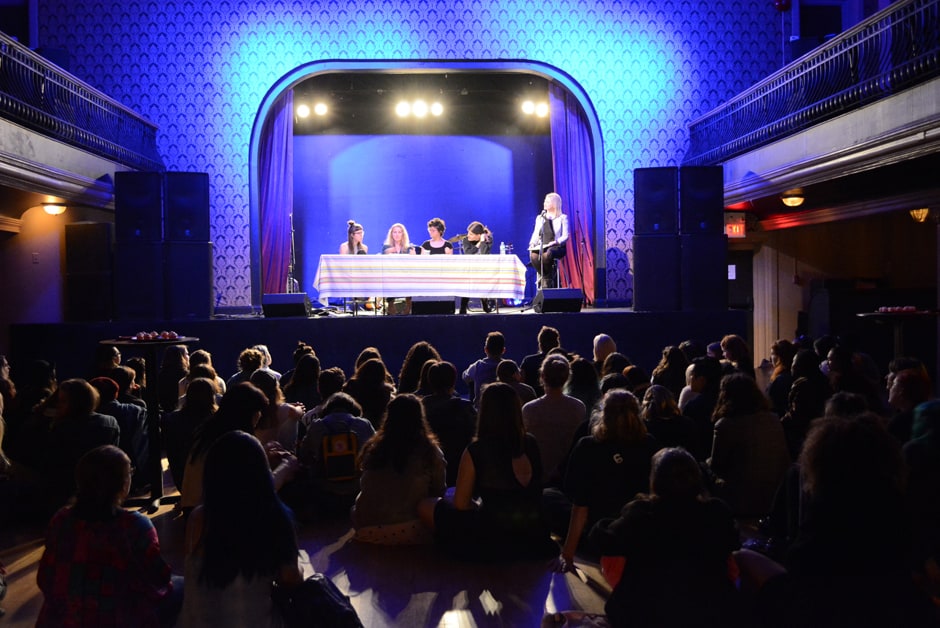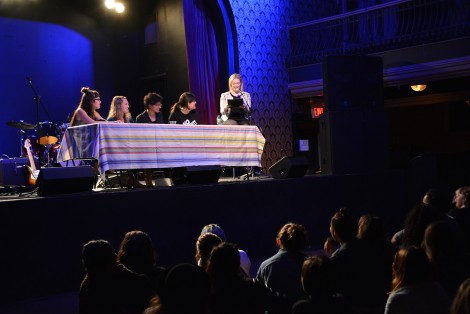“There’s a real fear of a teenage girl left to her own devices,” writes Haley Mlotek in a mega-essay about women and the current state of print media in the latest issue of Little Brother magazine: “Or worse, a teenage girl within a group of other teenage girls.”
This perfectly describes the scene last Wednesday evening at the Rookie Yearbook 3 launch party held at the Great Hall on Queen West. Mlotek was the moderator for the panel discussion that took place, where the number of teenagers greatly outnumbered the number of adults.
Everyone was there to help celebrate yet another year of Rookie Mag, an online website founded and edited by actual teenage superhero 18–year-old Tavi Gevinson. Somewhat unbelievably, she just graduated high school and has already accomplished a staggering amount for someone so young. She’s a writer, editor, actress, former style blogger, and singer. When she was 15, she slowly bowed out of fashion blogging in order to launch Rookie.
In 2014, being a teenage girl has become a weapon. In a media landscape that’s dominated by one-dimensional narratives with a tendency to put forth an image of teenage girls as superficial and shallow, it can be a toxic world for teenagers who are still “trying to figure it out.”
When Gevinson announced her plans to launch a magazine with the now-defunct Sassy editor, Jane Pratt, she saw that something was missing and her answer was Rookie. Despite what some may say, diversity remains an issue that many still don’t have the answer to. The magazine sector is still dominated by the publishing organizations run by seasoned professionals. Often, these individuals are white, upper-middle class men.
I’d imagine that if a major media executive had approached Gevinson with plans of helping her launch her magazine, her appropriate response would have been: “Obviously, you’ve never been a thirteen-year-old girl,”— a line taken directly from The Virgin Suicides. Three years and three yearbooks later, Gevinson has retained full control of all things Rookie-related.
Gevinson isn’t the only teenage girl making big things happen. This year’s Nobel Peace Prize co-recipient, Malala Yousafzai, received widespread recognition for her work advocating girl’s rights and education in Pakistan. Seventeen year-old singer Lorde — who wrote a piece for Rookie Yearbook 3 — became one of the youngest Grammy winners when she won awards for Song of the Year and Best Pop Solo Album. The wave of success that’s supporting some of the biggest teen musicians, actresses, and writers is something worth noting — there’s clearly something very different about being a teenager today as comparison to being a teenager in the 1990s. They still have a lot to say, but now have a better chance of being heard.
Yearbook 3 is more than just a print anthology of the best and most memorable Rookie content. It’s a celebration of teenage-dom — the good, bad, and awkward. Diversity is the key to Rookie’s widespread appeal and recognition. At a glance, there is something threatening about a magazine helmed by teenagers. Initially, a reader who might have never identified as a teenage girl might feel a bit alienated by Rookie. Teen magazines do have a tendency to speak to a very specific type of teenage girl. However, there’s something for everyone at Rookie. Their “Ask a Grown Man/Woman” series has featured a number of notable individuals such as Mad Men’s Jon Hamm, Radiohead frontman Thom Yorke, The Gossip’s Beth Ditto, and Community’s Gillian Jacobs and Danny Pudi, where the interviewees give candid answers to the burning questions we’ve all had at some point in our life. Jon Hamm’s answer to one girl’s question about relationship anxiety was: “Give the guy a break… don’t define yourself by who wants to get with you.”
Wednesday’s Rookie panel featured Rookie contributors writer Anna Fitzpatrick, illustrator Kendra Yee, poet Tova Benjamin, and Art & Design Editor Sonja Ahlers. Mlotek led the discussion on creating art, the contributors’ experiences as artists, and their relationship to art. When asked “Why create art?”, the audience, was treated to a number of refreshingly candid answers. Fitzpatrick explained that when you write about your personal experiences online, seeing the reactions from readers sort of “retroactively validates these experiences.”
Collaboration, or the collaborative experience, is a theme that popped up a few times throughout the panel and the thread that holds Rookie together. Yee and Benjamin talked about working together on a comic strip before even meeting each other. As an illustrator, Yee explained that she sometimes had trouble explaining her thoughts with words, which was why working with Benjamin was so successful because she just “gets it.” Fitzpatrick described receiving edits from editorial director, Anaheed Alani, and how the editors work magic on the stories published. While the story might belong to the name in the byline, the themes and ideas are shared by many.
After the panel, Toronto band Pins & Needles treated the guests to a live music dance party. I quickly purchased my own copy, only to overhear a number of older guests with their own copies of Rookie, talking about how they wished something like Rookie had existed when they were younger.



